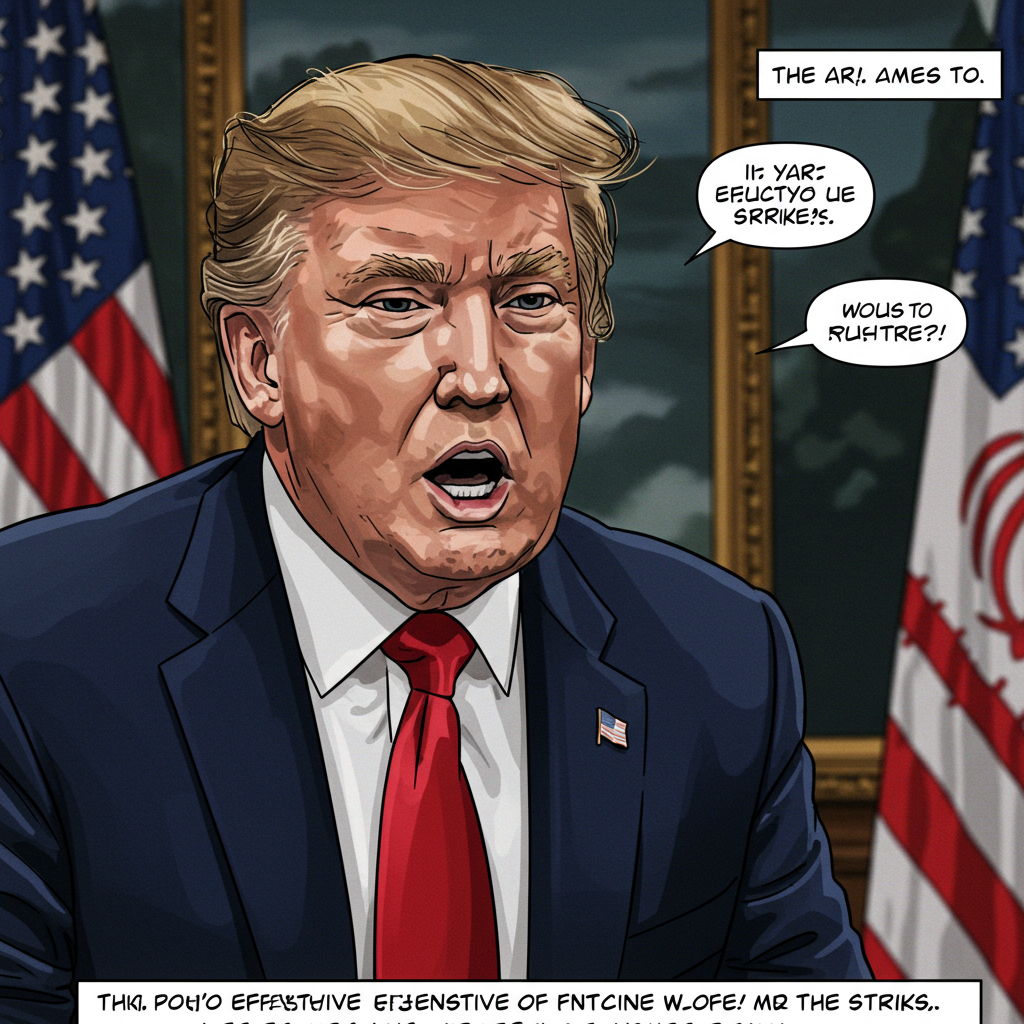The Middle East finds itself on a knife-edge as the volatile conflict between Israel and Iran intensifies, marked by escalating missile strikes and targeted attacks. At the center of the crisis is a pivotal decision point for the United States, with President Donald Trump actively weighing military options and the potential for direct intervention.
Escalating Attacks and Reciprocal Strikes
The recent surge in hostilities saw Israel targeted by a significant wave of Iranian missiles. Officials reported extensive damage to a major hospital in southern Israel following the attacks. In retaliation, Israel launched strikes deep inside Iran, targeting sites believed to be critical to Tehran’s nuclear program and military capabilities.
Israeli military sources indicated their strikes hit numerous targets across Iran, including uranium enrichment facilities, labs involved in converting uranium gas, and centrifuge production sites near Tehran and other regions. They assert these actions are necessary to degrade Iran’s ability to develop nuclear weapons, which they view as an existential threat. While an Israeli strike reportedly hit the Arak heavy water reactor, Iranian officials stated the facility was evacuated and there was no radiation danger. Israel also claims its strikes targeted missile launch and storage sites, as well as internal security headquarters, and potentially defense ministry buildings in Tehran, asserting air superiority.
Iran has responded fiercely, launching hundreds of missiles and drones towards Israel, reportedly causing casualties. Supreme Leader Ayatollah Ali Khamenei delivered a defiant national address, declaring that Iran will not surrender to pressure and warning that any US military intervention would inflict “irreparable damage” on Washington. Amidst the conflict, Iran experienced internet blackouts and road closures out of Tehran as residents expressed unease. Reports also emerged of Iran arresting individuals suspected of spying for Israel and the downing of an Israeli drone.
The Nuclear Dimension Takes Center Stage
A core focus of the current conflict is Iran’s nuclear program. Israel claims its strikes are setting back key components of the program by months or even years. The International Atomic Energy Agency (IAEA) has confirmed damage to at least two centrifuge production sites in Iran and noted that Iran is enriching uranium at a rate significantly exceeding civilian needs. However, the IAEA has also stated it lacks concrete proof of an active program specifically aimed at building a nuclear weapon.
Concerns remain high regarding the location of Iran’s near-bomb-grade uranium, which is reportedly stored in an underground facility in Isfahan, where IAEA inspectors currently lack normal access. Targeting some of Iran’s most fortified nuclear sites, such as the Fordo facility buried deep underground, presents immense military challenges and would likely require specialized US “bunker buster” munitions delivered by heavy bombers.
Trump’s Pivotal Decision Point
US President Donald Trump has convened high-level meetings in the Situation Room to assess America’s options. Reports suggest he has privately approved preliminary war plans against Iran but is holding off on issuing a final order. Publicly, Trump has stated his patience with Tehran “has already run out” and that Iran cannot be allowed to possess a nuclear weapon, claiming they were “a few weeks away” from achieving this.
However, Trump also acknowledges his uncertainty about military action, saying, “I may do it. I may not do it. Nobody knows what I’m going to do.” His administration is reportedly providing him with a range of military options, and the Pentagon has confirmed assets have been repositioned in the region to enhance defensive postures and prepare for potential strikes or evacuations.
Trump faces a significant dilemma: while receptive to arguments, including from Israel, that only the US can decisively halt Iran’s nuclear ambitions, he is wary of becoming embroiled in another prolonged foreign conflict he vowed to avoid. He has demanded Iran’s “unconditional surrender” and even raised the possibility of targeting Supreme Leader Khamenei, calling him an “easy target,” though Iran denies having requested talks with the US.
Internal Debate and International Reactions
The prospect of US military intervention has highlighted divisions within the US political landscape, including among Trump’s own supporters. Disagreements exist regarding the intelligence assessment of Iran’s nuclear program and the wisdom of deeper US entanglement. Meanwhile, some lawmakers are pushing for any decision on military action against Iran to require congressional approval.
Internationally, there is widespread concern. The UN Secretary-General has urged immediate de-escalation, warning of “enormous consequences” for regional and global peace. Russia has offered to mediate, suggesting a diplomatic path that addresses both Iran’s right to a peaceful atomic program and Israeli security concerns, while cautioning the US against military aid to Israel or striking nuclear facilities due to the risks posed by radioactive materials. European nations are planning diplomatic talks with Iran in Geneva, coordinated with the US, seeking concrete guarantees about the peaceful nature of its nuclear activities. Other nations like North Korea and China have voiced their perspectives on the escalating crisis.
The situation remains highly volatile as Israel continues its campaign against perceived Iranian threats and Iran vows retaliation. The critical decision regarding potential direct US military involvement looms large, holding profound implications for the entire region and international stability. While some Israeli officials suggest strikes could weaken the Iranian regime, experts remain skeptical that such actions alone would lead to a popular uprising or democratic transition, warning a regime collapse could potentially result in an even more authoritarian government. The status of Iran’s nuclear materials and inspection access remains a key point of concern for the international community amidst the escalating conflict.

